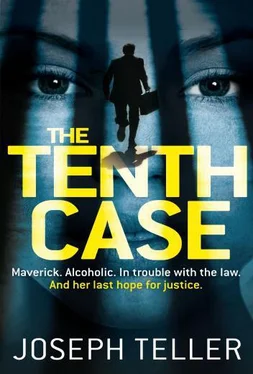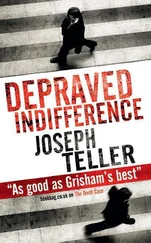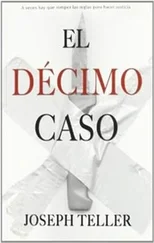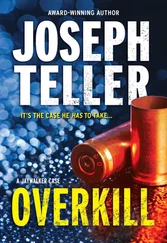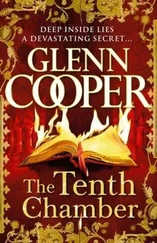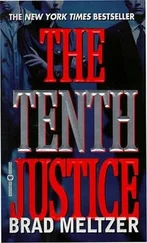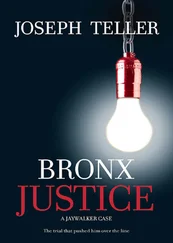Joseph Teller - The Tenth Case
Здесь есть возможность читать онлайн «Joseph Teller - The Tenth Case» — ознакомительный отрывок электронной книги совершенно бесплатно, а после прочтения отрывка купить полную версию. В некоторых случаях можно слушать аудио, скачать через торрент в формате fb2 и присутствует краткое содержание. Жанр: Криминальный детектив, на английском языке. Описание произведения, (предисловие) а так же отзывы посетителей доступны на портале библиотеки ЛибКат.
- Название:The Tenth Case
- Автор:
- Жанр:
- Год:неизвестен
- ISBN:нет данных
- Рейтинг книги:3 / 5. Голосов: 1
-
Избранное:Добавить в избранное
- Отзывы:
-
Ваша оценка:
- 60
- 1
- 2
- 3
- 4
- 5
The Tenth Case: краткое содержание, описание и аннотация
Предлагаем к чтению аннотацию, описание, краткое содержание или предисловие (зависит от того, что написал сам автор книги «The Tenth Case»). Если вы не нашли необходимую информацию о книге — напишите в комментариях, мы постараемся отыскать её.
The Tenth Case — читать онлайн ознакомительный отрывок
Ниже представлен текст книги, разбитый по страницам. Система сохранения места последней прочитанной страницы, позволяет с удобством читать онлайн бесплатно книгу «The Tenth Case», без необходимости каждый раз заново искать на чём Вы остановились. Поставьте закладку, и сможете в любой момент перейти на страницу, на которой закончили чтение.
Интервал:
Закладка:
And why did the police focus on that spouse or lover or best friend in the first place? Because it was easy, that's why. They knew right off the bat who they were looking for and where to do the looking. Crime solved, killer ap prehended, case closed, end of story.
But could Jaywalker really stand up in front of the jurors and tell them with a straight face that the detectives, having actually found the knife, the blouse and the towel at Barry's apartment, or inside some trash can or storm drain nearby, had decided to plant the items in Samara's town house out of their own misplaced certainty of her guilt? And even if they'd done that-already a leap of gigantic length-that still didn't explain who'd murdered Barry in the first place.
That was Friday night.
By Saturday morning, Jaywalker had decided that the best way to present his defense would be to come right out and admit to the jury that he had no idea who'd murdered Barry, except that it hadn't been Samara. And the genius of the American court system, he would explain, was that he didn't have to know, and neither did they. Remember, he would tell them, the defendant has no burden of proof. It wasn't the defense's job to convince you who actually committed the murder. It was the prosecution's job to convince you that Samara did it, and they had to convince you beyond all reasonable doubt. So the jurors mustn't let Tom Burke get away with an argument that went If not Samara, who? That wasn't good enough. And if, during de liberations, a fellow juror were to try to make that argu ment, they should soundly reject it.
You'll be given a verdict sheet, he would tell them, right before you begin your deliberations. It's going to list the crime that Samara's charged with: murder. Right after that, it's going to ask you to check one of two boxes, "Guilty" or "Not guilty." After "Not guilty," there's not going to be a P.S., "Well, if 'Not guilty,'please explain who did do it."
In other words, he would tell them, you're not being asked to play detectives here, to solve the crime. We've got plenty of detectives who get paid good taxpayer money to do just that. Nor are you being called upon to play God, to somehow transport yourselves back a year and a half ago in order to try to divine what might have happened that August night. You are jurors. Your job, as awesomely im portant as it is, is at the same time magnificently simple.
He crossed off magnificently and substituted majestically.
Your job is to pass judgment, he would tell them, to pass judgment on the evidence that you heard in this court room. Does that evidence convince you that it was Samara Tannenbaum who murdered her husband? And does it convince you of that beyond all reasonable doubt? Your answer must be a resounding "No!"
Was ringing better than r esounding? How about both? Okay, a ringing and resounding "No!"
Not bad.
By Saturday night Jaywalker's kitchen floor was littered with torn pieces of paper, all of them discarded arguments that at one moment had sounded like possibilities but twenty minutes later had struck him as totally worthless.
Maybe he needed to focus on a single suspect.
He went back to his List of Four. Anthony Mazzini, the super, was a nonstarter. Among other things, the jurors would never believe he had the intellect to pull off such an elaborate frame. Kenneth Redding, the co-op board pres ident, simply hadn't had enough at stake to do it. And William Smythe, Barry's accountant, had come off too squeaky-clean to seem capable of murder.
That left Alan Manheim, Barry's recently fired personal lawyer. Jaywalker reviewed his notes from Manheim's tes timony. On direct, Burke had had Manheim admit that he and Barry had had a "falling-out." They'd parted company over Barry's accusations of embezzlement six months before Barry's murder. True, Manheim denied the charge, even to the point of boasting that shortly after leaving Barry's employ, he'd landed a better paying position.
Jaywalker had gotten Manheim to offer the opinion that he'd been underpaid by Barry, even at the rate of over four million dollars annually, counting his bonus. And the amount of that little alleged embezzlement? Jaywalker would remind the jurors of that. In Manheim's own words, two hundred and twenty-seven million dollars. Jaywalker would repeat the numbers, as though in absolute awe of them. There were people on the jury who felt lucky to make two hundred and twenty-seven dollars a week, in cluding overtime. There were jurors who couldn't count to two hundred and twenty-seven million, let alone visualize the significance of that kind of wealth.
Manheim had had everything to lose. His money, his reputation, his new job, his law license. Not to mention his freedom. That's grand larceny Barry Tannenbaum accused him of, Jaywalker would tell the jurors. That's about as grand as larceny can get, as a matter of fact. W as that reason enough for Manheim to want Barry Tannenbaum out of the way? Here was how he would like them to think of it, Jaywalker would tell them. Alan Manheim, the alleged thief and embezzler, didn't just have a reason to kill Barry Tannenbaum, he had two hundred and twenty-seven million reasons.
Manheim had come off as a terrible witness, a fact only enhanced because it had been the prosecution who'd called him in the first place. He was sleazy, smug and self-serving. If Jaywalker were to end up deciding to point the jurors in the direction of one suspect to the exclusion of all others, Alan Manheim was certainly going to be his guy.
Jaywalker turned the lights off. It was past two in the morning, and he suspected he was no longer operating on all cylinders. He knew if he were to refocus and read back the last of the notes he'd written, the stuff about Alan Manheim, they, too, would end up in pieces on the kitchen floor. So he told himself his thinking was getting too fuzzy to continue. And then he told himself something else, the sacred creed of all procrastinators.
There was always tomorrow.
But as seductive a lover as she can be at first, procras tination makes a hideously cruel mistress. He who allows himself to be folded into her welcoming arms buys no true respite. The warmth and safe harbor she promises him are but an illusion, a simple projection of his own needs. All he ends up with is pure agony, drawn out, intensified and robbed of the tiniest measure of comfort or the least sem blance of peace.
It would be hours before sleep would come to Jay walker, and when it did, it came in fits and starts, punctu ated by fragments of dreams that came and went, but refused to make sense. Alan Manheim appeared in one of them, laughing at Jaywalker from the witness stand, the pupils of his eyes dilated and transformed into dollar signs. "But how could I have gotten into her home," he taunted, "in order to hide the evidence?" Jaywalker's wife was in a second dream, gently scolding him for not emptying the dishwasher or being able to win the impossible case, the one out of ten nobody could win. In yet another, a serene Roger McBride was being wheeled from the hospital by his adoring wife and children, a knife still stuck in his chest. His hands were folded pontifically in his lap, clasped around something that at first glance looked like a large metal cross. Only when the wheelchair drew nearer was Jaywalker able to see that it wasn't a cross at all but an enormous jailer's key.
By Sunday morning Jaywalker was experiencing the first symptoms of panic. He wasn't talking to himself yet, or pacing the floor. In fact, he was still in what he consid ered his constructive mode, jotting ideas down on paper as they occurred to him, then discarding them as soon as it occurred to him that they were worthless. So it was a con trolled panic still, but an incremental step along the way to full-blown, out-and-out hysteria.
It had happened before, in other cases, preparing for other summations. Arguments that had seemed airtight suddenly developed leaks and needed patching, reinforc ing or restructuring. But there'd always been a solution; it had simply been a matter of holding the problem up to the light, identifying the weakness and addressing it.
Читать дальшеИнтервал:
Закладка:
Похожие книги на «The Tenth Case»
Представляем Вашему вниманию похожие книги на «The Tenth Case» списком для выбора. Мы отобрали схожую по названию и смыслу литературу в надежде предоставить читателям больше вариантов отыскать новые, интересные, ещё непрочитанные произведения.
Обсуждение, отзывы о книге «The Tenth Case» и просто собственные мнения читателей. Оставьте ваши комментарии, напишите, что Вы думаете о произведении, его смысле или главных героях. Укажите что конкретно понравилось, а что нет, и почему Вы так считаете.
